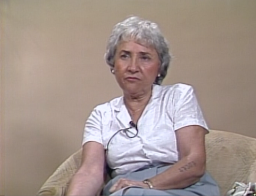You searched for: 5G基站源码系统快速搭建【TG���������@EK7676】平台包网搭建5G基站源码系统快速搭建【TG���������@EK7676】平台包网搭建13mqZeuPGv
<< Previous | Displaying results 361-370 of 426 for "5G基站源码系统快速搭建【TG���������@EK7676】平台包网搭建5G基站源码系统快速搭建【TG���������@EK7676】平台包网搭建13mqZeuPGv" | Next >>
-
Bela Blau
ID CardBela's city of Bratislava, located on the banks of the Danube river, had an old and important Jewish community. Bela was the eighth child in his large Jewish family. His father was a furrier. At age 16 Bela began working as a salesman for a textile business. In 1930 he was called up for 18 months of army service. 1933-39: Bela and his wife moved to the Slovakian city of Zilina. Their son was born in November 1937. Bela worked for a German photographic company until 1938, when he lost his job because he…
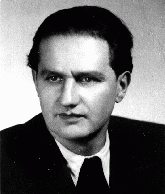
-
Pearl Harbor
ArticleJapan’s aerial attack on Pearl Harbor changed many Americans' attitudes toward involvement in WWII. Learn more about the events, facts, and background info.

-
Ruth Gabriele Silten
ID CardGabriele was the only child of Jewish parents living in the German capital of Berlin. Her grandfather owned a pharmacy and a pharmaceuticals factory, where Gabriele's father also made his living. 1933-39: In 1938 the Nazis forced Ruth's grandfather to sell his factory and pharmacy for very little money to an "Aryan" German. After that, her father decided they should move to Amsterdam where it was safer for Jews. She was 5 years old and wanted to stay in Berlin. She didn't understand why she had to leave…
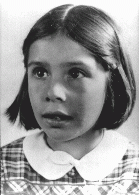
-
Ernst Silten
ID CardErnst was one of five sons born to a Jewish family in the Prussian city of Koenigsberg. He studied pharmacy and earned his doctorate in the late 1880s. Ernst spent several years as an apprentice before buying his own pharmacy in Berlin. Later, he also acquired a pharmaceuticals factory and supplied oxygen to hospitals. He married Marta Friedberg and the couple raised two sons. 1933-39: In Berlin, Ernst and his family lived in an apartment above their pharmacy and factory. In 1938 Ernst was forced to sell…
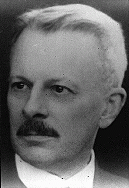
-
Erzsebet Markovics Katz
ID CardErzsebet was born to Jewish parents living in a town on the Bodrog River in northeastern Hungary. Sarospatak was a picturesque town with a ruined medieval fortress, the Windischgratz castle, and many wineries, flour mills, and brickworks. Erzsebet's father was a locksmith and sheet-metal worker. 1933-39: Erzsebet has married Jozsef Katz. It was a lovely, formal wedding. Jozsef comes from a large Jewish family. He's a joiner by trade and was working in Sarospatak when they met. Now they have moved here to…
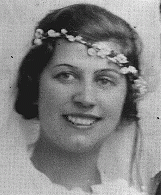
-
Atrocities against Burma's Rohingya Population
ArticleThe Burmese military has targeted the Rohingya people because of their ethnic and religious identity. The military’s actions constitute genocide and crimes against humanity. Learn more
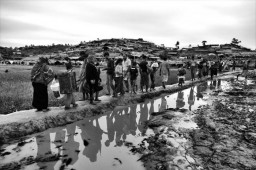
-
Dismissal letter from the Berlin transit authority
DocumentA letter written by the Berlin transit authority (Berliner Verkehrs Aktiengesellschaft) to Viktor Stern, informing him of his dismissal from his post with their agency as of September 20, 1933. This action was taken to comply with provisions of the Law for the Restoration of the Professional Civil Service. On April 7, the German government issued the Law for the Restoration of the Professional Civil Service (Gesetz zur Wiederherstellung des Berufsbeamtentums), which excluded Jews and political opponents…
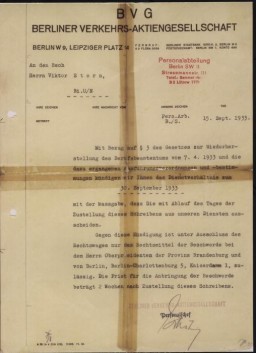
-
Sandor (Shony) Alex Braun describes how music gave him the strength to survive while imprisoned in concentration camps
Oral HistoryShony was born to religious Jewish parents in a small Transylvanian city. He began to learn the violin at age 5. His town was occupied by Hungary in 1940 and by Germany in 1944. In May 1944, he was deported to the Auschwitz camp in Poland. He was transferred to the Natzweiler camp system in France and then to Dachau, where he was liberated by US troops in April 1945. In 1950, he immigrated to the United States, and became a composer and a professional violinist.
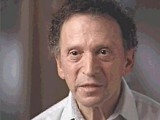
-
Leopold Page describes meeting German industrialist Oskar Schindler
Oral HistoryLeopold was a teacher in Krakow, Poland, when World War II began in 1939. While serving in the Polish army, he was captured by Germans. Leopold escaped from a prisoner-of-war transport. Soon after, he met the German industrialist Oskar Schindler. The two became friends. Leopold was forced to live in the Krakow ghetto. He later worked in Schindler's factory in Bruennlitz. He and the other Jews who worked there were treated relatively well and protected from the Nazis. After the war, Leopold moved to the…
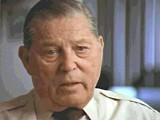
-
Sally Pitluk describes her removal from forced labor at Budy
Oral HistorySally Pitluk was born to Jewish parents in Płońsk, Poland in 1922. A few days after the German invasion of Poland in 1939, Płońsk was occupied. Sally and her family lived in a ghetto from 1940-1942. In October of 1942, Sally was transported to Auschwitz, where she was tattooed and moved into the subcamp Budy for forced labor. She stayed in the Auschwitz camp complex until the beginning of 1945 when she and other prisoners were death marched to several different camps. She was liberated in 1945 and…
